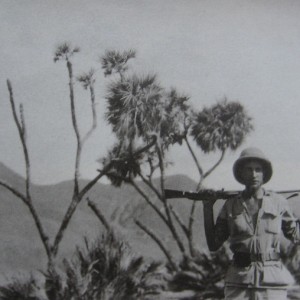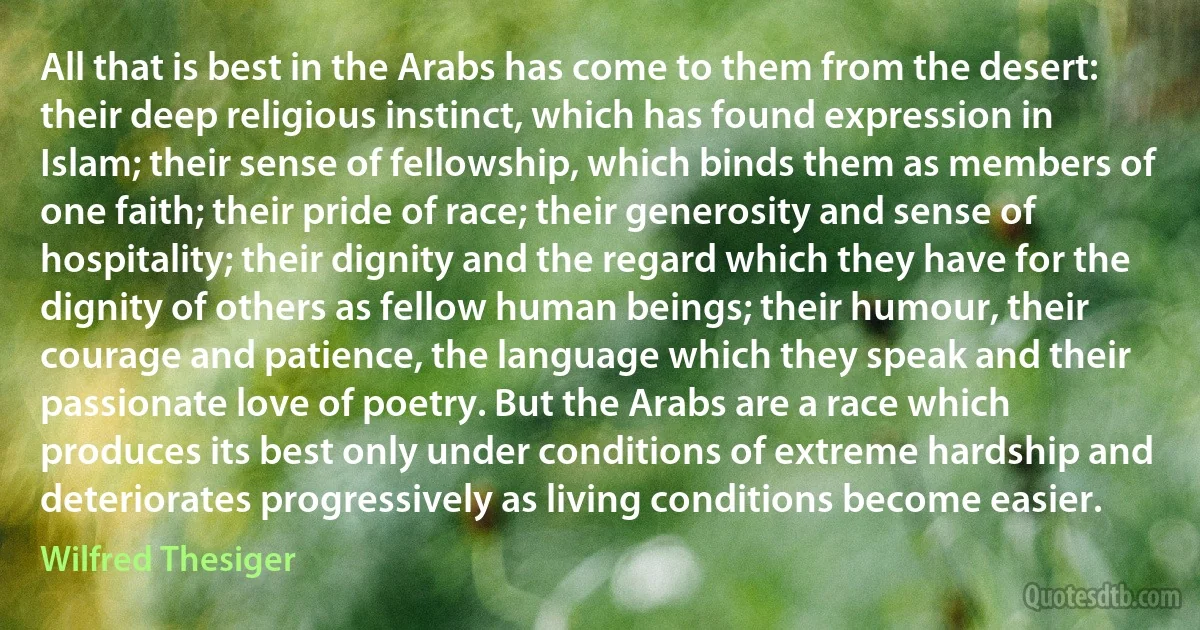Wilfred Thesiger quotes
In July 1969 I happened to be in Kenya, on the shore of Lake Rudolf, when I heard with incredulity from a naked Turkana fisherman that the 'Wazungu' as he called Europeans, including Americans - had landed on the moon. He had heard the news at a distant mission station. To him this achievement, being incomprehensible, was without significance; it filled me, however, with a sense of desecration, and of despair at the deadly technical ingenuity of modern man. Even as a boy I recognized that motor transport and aeroplanes must increasingly shrink the world and irrevocably destroy its fascinating diversity. My forebodings have been amply fulfilled.

Wilfred Thesiger
My first night in camp, as I sat eating sardines out of a tin and watching my Somalis driving the camels up from the river to couch them by the tent, I knew that I would not have been anywhere else for all the money in the world. For a month I travelled in an arid, hostile land. I was alone; there was no one whom I could consult; if I met with trouble from the tribes I could get no help; if I were sick there was no one to doctor me. Men trusted me and obeyed my orders; I was responsible for their safety. I was often tired and thirsty, sometimes frightened and lonely, but I tasted freedom and a way of life from which there could be no recall.

Wilfred Thesiger
It is characteristic of Bedu to do things by extremes, to be either wildly generous or unbelievably mean, very patient or almost hysterically excitable, to be incredibly brave or to panic for no apparent reason. Ascetic by nature, they derive satisfaction from the bare simplicity of their lives and scorn the amenities which others would judge essential.

Wilfred Thesiger
All my life I had hated machines. I could remember how bitterly at school I had resented reading the news that someone had flown across the Atlantic or travelled through the Sahara in a car. I had realized even then that the speed and ease of mechanical transport must rob the world of all diversity.

Wilfred Thesiger
As I looked round the clearing at the ranks of squatting warriors and the small isolated group of my own men, I knew that this moonlight meeting in unknown Africa with a savage potentate who hated Europeans was the realization of my boyhood dreams. I had come here in search of adventure: the mapping, the collecting of animals and birds were all incidental. The knowledge that somewhere in this neighbourhood three previous expeditions had been exterminated, that we were far beyond any hope of assistance, that even our whereabouts were unknown, I found wholly satisfying.

Wilfred Thesiger
In the desert I had found a freedom unattainable in civilization; a life unhampered by possessions, since everything that was not a necessity was an encumbrance. I had found, too, a comradeship inherent in the circumstances, and the belief that tranquillity was to be found there. I had learnt the satisfaction which comes from hardship and the pleasure which derives from abstinence: the contentment of a full belly; the richness of meat; the taste of clean water; the ecstasy of surrender when the craving for sleep becomes a torment; the warmth of a fire in the chill of dawn.

Wilfred Thesiger
Arabs rule but they do not administer. Their government is intensely individualistic, and is successful or unsuccessful according to the degree of fear and respect which the ruler commands, and his skill in dealing with individual men. Founded on an individual life, their government is impermanent and liable to end in chaos at any moment. To Arab tribesmen this system is comprehensible and acceptable, and its success of failure should not be measured in terms of efficiency and justice as judged by Western standards. To these tribesmen security can be bought too dearly by the loss of individual freedom.

Wilfred Thesiger
As I listened I thought once again how precarious was the existence of the Bedu. Their way of life naturally made them fatalists; so much was beyond their control. It was impossible for them to provide for a morrow when everything depended on a chance fall of rain or when raiders, sickness, or any one of a hundred chance happenings might at any time leave them destitute, or end their lives. They did what they could, and no people were more self-reliant, but if things went wrong they accepted their fate without bitterness, and with dignity as the will of God.

Wilfred Thesiger
I also questioned whether it was right to try to impose on the Sudanese the conventions and values of our utterly alien civilization, and sometimes expressed these doubts in letters to my mother. I could not help feeling that other races were entitled to their own customs and moral standards, however much these might differ from ours.

Wilfred Thesiger
I knew that I had made my last journey in the Empty Quarter and that a phase in my life was ended. Here in the desert I had found all that I asked; I knew that I should never find it again. But it was not only this personal sorrow that distressed me. I realized that the Bedu with whom I had lived and travelled, and in whose company I had found contentment, were doomed. Some people maintain that they will be better off when they have exchanged the hardship and poverty of the desert for the security of a materialistic world. This I do not believe. I shall always remember how often I was humbled by those illiterate herdsmen who possessed, in so much greater measure than I, generosity and courage, endurance, patience, and light-hearted gallantry. Among no other people have I felt the same sense of personal inferiority.

Wilfred Thesiger
At first glance they [his Bedu companions] seemed to be little better than savages, as primitive as the Danakil, but I was soon disconcerted to discover that, while they were prepared to tolerate me as a source of very welcome revenue, they never doubted my inferiority. They were Muslims and Bedu and I was neither. They had never heard of the English, for all Europeans were known to them simply as Christians, or more probably infidels, and nationality had no meaning to them. They had heard vaguely of the war as a war between the Christians, and of the Aden government as a Christian government. Their world was the desert and they had little if any interest in events that happened outside it.

Wilfred Thesiger
Wilfred Thesiger
 Occupation: Writer
Occupation: Writer
Born: June 3, 1910
Died: August 24, 2003
Quotes count: 54

![These [RAF] airmen were my fellow countrymen, and I was proud to be of their race. I knew the essential decency which was the bedrock of their character, their humour, stubbornness, and self-reliance. I knew that if called upon they could adapt themselves to any kind of life, in the desert, in the jungle, in mountains or on the sea, and that in many respects no race in the world was their equal. But the things that interested them bored me. They belonged to an age of machines; they were fascinated by cars and aeroplanes, and found their relaxation in the cinema and the wireless. I knew that I stood apart from them and would never find contentment among them, whereas I could find it among the Bedu, although I should never be one of them. (Wilfred Thesiger)](https://cdn.quotesdtb.com/img/quotes_images_webp/44/wilfred-thesiger-age-apart-963044.webp)











